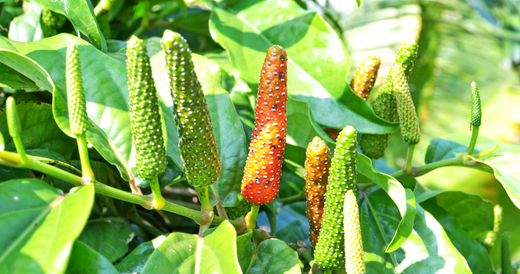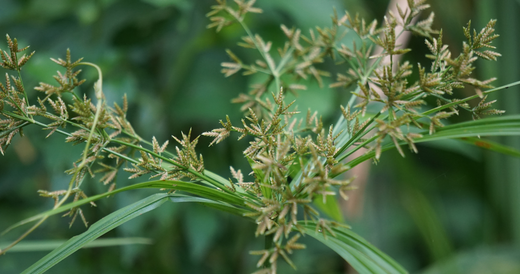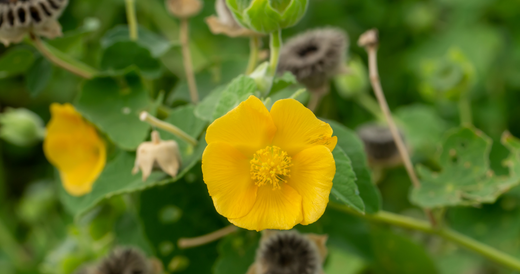
Pippali (Long Pepper) Benefits, Uses & Precautions
What is Pippali?
Pippali, a remarkable plant, is known for its diverse benefits in traditional medicine. Commonly known as long pepper, it boasts anti-inflammatory properties, aids digestion, and supports respiratory health. With a spicy kick, Pippali adds flavour to cuisine and wellness to our lives, making it a cherished herb in holistic practices.
- Hindi Name: Pippali
- Sanskrit Name: Pippali
- English Name: Long Pepper
- Latin Name: Piper longum Linn
Evidence-Based Benefits of Pippali
Here are 10 evidence-based Benefits of Pippali explained concisely:
- Anti-inflammatory - Reduces swelling and inflammation
- Analgesic - Provides pain relief
- Antitussive - Relieves coughs
- Digestive aid - Improves digestion, reduces bloating/gas
- Antioxidant - Neutralizes damaging free radicals
- Immunomodulator - Boosts immune function
- Antibacterial - Inhibits bacterial infections
- Antifungal - Protects against fungal infections
- Neuroprotective - Protects nerve cells and pathways
- Chemoprotective - Guards against DNA mutations that cause cancer

Source: Canva
1. Pippali for swelling and inflammation
Pippali has compounds that reduce ouchy swelling and inflammation. So if you twist your ankle or have stiff, sore joints, Pippali could help calm that reaction by quieting the body's red alert signals. Here, you can also check ayurvedic medicines for immunity, weight and other health issues.
2. Pippali for pain relief
If you deal with headaches, arthritis, back pain or cramps - Pippali can act as a natural painkiller without nasty side effects! Its healing chemicals ease aches and soothe frazzled nerves. Just more proof that plants can pack some powerful comfort.
3. Pippali for cough relief
Annoying coughs don't stand chance against Pippali! The antiseptic goodness in this anti-cough warrior loosens mucus, clears your airways and stops that awful tickle. It's gentler than cough syrup, so no more coughing fits keeping the house up.
4. Pippali for reducing bloating/gas
Ah, nothing worse than a puffy, gassy belly...except maybe Uncle Leo's toots! But Pippali helps digestion run more smoothly - absorbing nutrients better, preventing gas buildup and relieving bloating. No more wishing pants had elastic waistbands after dinner!
5. Pippali for boosting immunity
Cold and flu season is no match for Pippali, which works double-duty to support immune function. It's loaded with antioxidants to protect cells and also revs up the body's natural "sick fighter squad" to kill viruses and bacteria more efficiently.
6. Pippali against bacterial infections
Science confirms this mighty medicinal plant can beat down salmonella, E. coli and other pesky bacteria before they can make you sick.
7. Pippali protects against fungal infections
Ringworm, athlete’s foot and other fungal problems don’t stand a chance against powerful Pippali extracts. Plant chemicals block cell mutations that let fungus thrive on skin and nails.
8. Pippali for nerve cells and pathways
The compounds in Pippali keep delicate nerves safe from damage or disease. As we age, nerves can get thrown off track and cause problems but Pippali clears debris to maintain healthy pathways.

Source: Canva
9. Pippali guards against DNA mutations
Pippali shields cells from DNA typos that can eventually lead to cancer down the road. So, eating Pippali regularly may help lower the risks over time.
Other Guides
Nutrition Facts of Pippali
The Pippali plant is sure packs a nutritious punch! It's chock full of many good things that help our bodies work right. It has lots antioxidants - these are like little superheroes that go around cells, protecting them from damage and sickness. Important stuff!
We get antioxidants from vitamins A, C and E, which Pippali is overflowing with. It also contains important minerals like iron, calcium and zinc. We need these to make muscles strong, blood healthy, and brains smart! The minerals do big jobs keeping us energised.
Here is the nutrition information of the Pippali plant presented in a table format:
|
Essentials Components |
Purpose |
|
Vitamin A |
Antioxidant that maintains healthy vision, skin, immune function |
|
Vitamin C |
Antioxidant that supports immune health, iron absorption, wound healing |
|
Vitamin E |
Antioxidant that protects cell membranes and vital nutrients |
|
Iron |
An oxygen-carrying mineral that prevents anemia and boosts energy |
|
Calcium |
Mineral that supports bone strength, nerve & muscle function |
|
Zinc |
A mineral that facilitates enzyme reactions, immunity, and protein synthesis |
|
Carotenoids |
Antioxidants that enhance immunity and reduce risk of disorders |
|
Dietary Fiber |
Promotes healthy digestion, gut microbiome, & cholesterol levels |
|
Piperine |
Bioactive compound with anti-inflammatory & disease-preventative effects |
How Does Pippali Plant Work for Health Issues?
The Pippali plant provides various health benefits thanks to the potent blend of natural compounds within its leaves, stems, and roots. These phytochemicals interact with human cells and biological processes to reduce pain and inflammation, calm respiratory issues, treat digestive distress, boost immunity, and slow the progression of chronic diseases.
Specifically, components like piperine found abundantly in Pippali can inhibit inflammatory pathways that lead to swollen joints, ease muscle tightness, thin excess mucus secretions to relieve coughs and much more. With an intricate understanding of how illness manifests in the body, Pippali’s complexes of organic compounds act almost pharmacologically to restore well-being from the cellular level up.
Top Ways You Can Use Pippali
- Pippali Churna
- Pippali Tablet

Source: Canva
Scientific Facts Related to Pippali
A study published in the *Journal of Ethnopharmacology* has shown that Pippali possesses anti-cancer properties and can induce apoptosis (programmed cell death) in cancer cells, particularly in breast cancer and leukemia cells. Link to the study.
In addition to this, now you can buy Pippali medicines from our website "zanducare.com" and get discounts.
Top Pippali Myths and Facts
Myths
- Pippali is too spicy for medicinal use
- Pippali should be avoided during pregnancy
- Pippali is unsafe for children
- Pippali only treats digestion issues
- Pippali will interfere with prescription drugs
Facts
- Pippali exhibits scientifically proven antioxidant, anti-inflammatory and antimicrobial properties.
- Clinical trials support oral Pippali to alleviate arthritis swelling and pain.
- It contains compounds shown to protect liver health by reducing toxins cell damage.
- May boost nutrient absorption, making vitamins more bioavailable.
- Ayurveda safely utilises Pippali’s healing properties for lung health and respiratory issues.
Other Plants
Our Thoughts
Pippali, the revered Long Pepper in Ayurveda, acts as a powerhouse of well-being. From enhancing digestion to fostering respiratory health, its multifaceted benefits enrich both culinary experiences and holistic healing. Using Pippali helps provide us with ancient wisdom, promoting balance and vitality for a healthier, harmonious existence.
FAQs
1. What are some of the traditional Ayurvedic uses for Pippali?
Pippali has been used traditionally in Ayurveda to enhance digestion, relieve respiratory issues, reduce inflammation and pain, boost immunity, inhibit infections, protect nerve health, and potentially prevent cancer.
2. What makes Pippali so beneficial for health?
Pippali contains a potent blend of compounds like piperine, vitamins A, C, and E, antioxidants, minerals, carotenoids, and dietary fiber that interact with the body in various healing ways - from fighting inflammation and infection to calming the gut and even protecting at the cellular level.
3. Is it safe to take Pippali while pregnant?
The content does not specifically recommend or caution against Pippali use during pregnancy. As with any supplement, while expecting, it's best to consult an obstetrician before using.
4. How does Pippali target so many health issues?
Pippali leverages organic compounds like natural drugs to influence multiple bodily processes tied to illness - including immune pathways, inflammatory responses, mucus secretion, tissue/cell protection, gut health, and more.
5. Are there any negative side effects associated with Pippali?
No, there are no side effects of Pippali.







Leave a comment
This site is protected by hCaptcha and the hCaptcha Privacy Policy and Terms of Service apply.